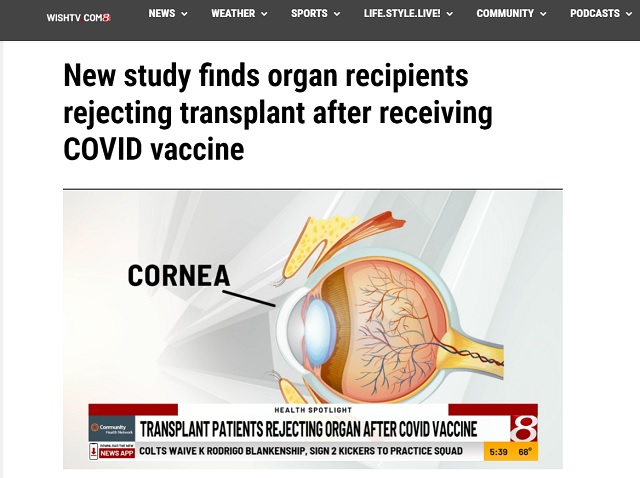Study: Some Organ Recipients Rejecting Transplant After Covid VaccineChris MenahanInformationLiberation Sep. 14, 2022 |
Popular 
As Poll Finds Ukrainians Want to End War, U.S. Pushes Zelensky to Bomb Russia and Expand Conscription

FBI Pays Visit to Pro-Palestine Journalist Alison Weir's Home

Schumer Moves to Silence Criticism of Israel as Hate Speech With 'Antisemitism Awareness Act'

Federal Judge Orders Hearing Into Questionable 'Auction' of Infowars to The Onion

'More Winning!' Ben Shapiro Celebrates Trump Assembling an Israel First Cabinet
  "Some transplant recipients are rejecting their new organ and scientists say the coronavirus vaccine may be to blame," WISH TV reports. "Some transplant recipients are rejecting their new organ and scientists say the coronavirus vaccine may be to blame," WISH TV reports.WATCH: From WISH, "New study finds organ recipients rejecting transplant after receiving COVID vaccine": According to a new study published in the Journal of Clinical Medicine, acute corneal allografts are being rejected by immunized patients who've undergone the procedure. Researchers say the underlying cause could be tied to a systemic inflammatory response elicited by the shot post-jab.Just to be clear, two people mentioned in the study had their corneal transplant rejected post-covid vaccine despite having had the surgery more than 20 years ago. Here's an excerpt from the study: Since the beginning of the COVID-19 pandemic in 2019, efforts toward vaccination have continued worldwide due to the uncontrollable spread of SARS-CoV-2 infection and the increasing number of COVID-19 cases. However, despite the low occurrence rates of high-risk complications after vaccination, an appreciable number of vaccine recipients have experienced a wide range of post-vaccination symptoms. At present, COVID-19 vaccines are believed to be associated with a spectrum of systemic symptoms, and appropriate interventions should be undertaken on a case-by-case basis. In this systematic review, we extracted data regarding clinical features of acute corneal allograft rejection (21 patients [23 eyes]) that occurred after the administration of the COVID-19 vaccine. Among them, >95% of eyes (22/23 eyes) had corneal allograft rejection within 3 weeks from vaccination (mean: 10.4 days, median: 7 days). As the global society promotes additional booster schedules in consideration of emerging variants, it is empirical that the effects of these vaccines on corneal grafts be elucidated. To establish appropriate immune-modulatory interventions, continued data accrual and investigation of the effects of COVID-19 vaccines should be conducted by observing the vaccination course and associated physiological changes in corneal allograft recipients.This is probably only scratching the surface. The study's authors claimed they could only find one other case of rejected transplants in other organs but another recent study found dozens. A study the NIH posted in August, which searched through a host of medical journals, found "one hundred thirty-six cases from fifty-two articles" of "solid organ rejection post-SARS-CoV-2 vaccination or COVID-19 infection." "One hundred thirty-six cases from fifty-two articles were included in the qualitative synthesis of this systematic review (56 solid organs rejected post-SARS-CoV-2 vaccination and 40 solid organs rejected following COVID-19 infection). Cornea rejection (44 cases) was the most frequent organ observed post-SARS-CoV-2 vaccination and following COVID-19 infection, followed by kidney rejection (36 cases), liver rejection (12 cases), lung rejection (2 cases), heart rejection (1 case) and pancreas rejection (1 case). [...] A total of fifty-six solid organ rejections were reported post-SARS-CoV-2 vaccination [Pfizer-BioNTech (n = 31), Moderna (n = 14), Oxford Uni-AstraZeneca (n = 10) and Sinovac-CoronaVac (n = 1)]."The NIH also has a study on a 23-year-old woman who underwent a kidney transplant "who presented an acute rejection after the second dose of the BNT162b2 mRNA COVID-19 Vaccine (Pfizer-BioNTech)." "She had undergone a deceased donor kidney transplantation for nephronophthisis 18 months earlier," the study said. "The post-transplant period was uneventful." As a reminder, some hospitals cruelly mandated sick patients on their organ transplant list get the shot in order to get their transplants performed -- even if they had already recovered from covid. Follow InformationLiberation on Twitter, Facebook, Gab, Minds and Telegram. |



